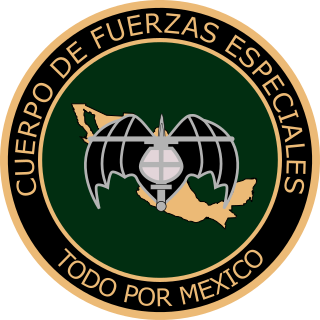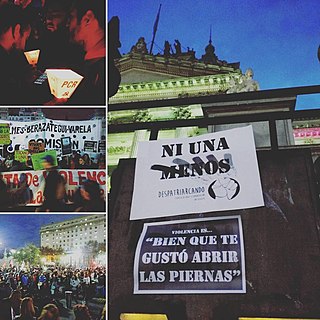Related Research Articles

The punk subculture includes a diverse and widely known array of music, ideologies, fashion, and other forms of expression, visual art, dance, literature, and film. Largely characterised by anti-establishment views, the promotion of individual freedom, and the DIY ethics, the culture originated from punk rock.

Blue Man Group is an American performance art company formed in 1987. It is known for its stage productions that incorporate many kinds of music and art, both popular and obscure. Its performers, known as Blue Men, have their skin painted blue. They are mute during shows and always appear in groups of three.

The Special Forces Corps are the special forces battalions of the Mexican Army. Formerly the Special Forces Airmobile Group (Spanish: Grupo Aeromóvil de Fuerzas Especiales) or GAFE, the SF corps has six regular battalions; plus four specialized units, one of those units is the Fuerza Especial de Reaccion, the other three remain secretive for the public; the motto of the SF Corps is Todo por México.

Street harassment is a form of harassment, primarily sexual harassment that consists of unwanted sexualised comments, provocative gestures, honking, wolf whistles, indecent exposures, stalking, persistent sexual advances, and touching by strangers, in public areas such as streets, shopping malls and public transportation. Besides actions or comments that contain a sexual connotation, it often includes homophobic and transphobic slurs, and hateful comments referencing race, religion, class, ethnicity and disability. The practice is rooted in power and control and is often a reflection of societal discrimination, and has been argued to sometimes result from a lack of opportunities for expression of interest or affection.
Latino punk is punk music created by Latino people in Latin America and the United States. The angst and protest qualities of punk music and style have had a strong appeal to Latino youth in the U.S., and to the people in Latin America. It is impossible to pinpoint the exact location or moment when Latinos began engaging in the punk subculture. However, Latin American rock began showing aspects of punk music during the mid-1960s with the Peruvian band Los Saicos; this band reflected many aspects of other proto-punk bands such as the Yardbirds. The Saicos were predecessors to some of the most influential proto-punk bands in the U.S., such as New York Dolls, MC5, and The Stooges
Stick Men with Ray Guns was an American punk rock group from Dallas, Texas. The group's name comes from a comic that Bobby Soxx had created called "Stick Man with Ray Gun". The Stick Man was a crazed, racist character who walked the streets of his neighborhood blasting anyone with his raygun that he thought was defiling his race or just bugged him.

Rodrigo González,, better known as Rockdrigo or El profeta del nopal, was a Mexican singer-songwriter. He died at age 35 with his girlfriend, Francoise Bardinet, when the apartment building in which he was living collapsed in the Mexico City earthquake of 19 September 1985. His early death made him a legend in Mexican rock.

Atrévete a Soñar is a Mexican teen telenovela, produced by Luis de Llano for Televisa, under the license of Ideas del Sur. Atrévete a Soñar is an adaptation of the Argentine telenovela, Patito Feo.
The Guadalajara Pride is an event that celebrates diversity in general and seeks equal rights for LGBT people, is celebrated in the city of Guadalajara, Mexico.
Tatyana Fazlalizadeh is an American artist, activist, and freelance illustrator. She is best known as the creator of the campaign and art exhibition Stop Telling Women to Smile.

José Hernández Delgadillo was a Mexican painter and muralist best known for carrying on the traditions of Mexican muralism in the latter 20th century. He created over 160 murals in Mexico and the United States, with most of his work, especially after 1970, containing strong political messages. Many of these messages have been unpopular in Mexico, which has made the artist somewhat obscure and some of his murals have been destroyed. Hernández Delgadillo's main recognition is membership in the Salón de la Plástica Mexicana honor society, but his home state has made effort to rescue and promote his life and work.
Benito Messeguer was a Mexican artist born in Spain, best known for his murals which continued much of the work of the Mexican muralism movement. His work was recognized with a tribute at the Palacio de Bellas Artes shortly before his death and membership in the Salón de la Plástica Mexicana.

Mónica Mayer is a feminist Mexican artist, activist, and art critic whose work includes performance, digital graphics, drawing, photography and art theory. As a conceptual artist, curator, art critic and art theorist she has been engaged in various forums and groups, and has organized workshops and collective movements. From 1988 to 2008, she was a columnist for Mexican newspaper, El Universal. She continues writing for various blogs.

Ni una menos is a Latin American fourth-wave grassroots feminist movement, which started in Argentina and has spread across several Latin American countries, that campaigns against gender-based violence. This mass mobilization comes as a response to various systemic issues that proliferate violence against women. In its official website, Ni una menos defines itself as a "collective scream against machista violence." The campaign was started by a collective of Argentine female artists, journalists and academics, and has grown into "a continental alliance of feminist forces". Social media was an essential factor in the propagation of the Ni Una Menos movement to other countries and regions. The movement regularly holds protests against femicides, but has also touched on topics such as gender roles, sexual harassment, gender pay gap, sexual objectification, legality of abortion, sex workers' rights and transgender rights.

Women have made significant contributions to punk rock music and its subculture since its inception in the 1970s. In contrast to the rock music and heavy metal scenes of the 1970s, which were dominated by men, the anarchic, counter-cultural mindset of the punk scene in mid-and-late 1970s encouraged women to participate. This participation played a role in the historical development of punk music, especially in the US and UK at that time, and continues to influence and enable future generations. Women have participated in the punk scene as lead singers, instrumentalists, as all-female bands, zine contributors and fashion designers.
Hijas de Cuauhtémoc was a student Chicana feminist newspaper founded in 1971 by Anna Nieto-Gómez and Adelaida Castillo while both were students at California State University, Long Beach.

The Not in This Lifetime... Tour was a concert tour by hard rock band Guns N' Roses, spanning from April 1, 2016, to November 2, 2019. It featured classic lineup members Axl Rose, Slash and Duff McKagan, marking the first time since the Use Your Illusion Tour in 1993 that the three performed together. After the previous tour in 2014, guitarists DJ Ashba & Ron "Bumblefoot" Thal, bassist Tommy Stinson and keyboardist Chris Pitman left Guns N' Roses, leaving the band with several open spots. Former members Slash and McKagan rejoined the band and Melissa Reese joined as keyboardist. The group embarked on a world tour that spanned all continents except Antarctica. They performed 175 shows making it their third longest tour ever, just behind the Use Your Illusion Tour and the Chinese Democracy Tour. The group welcomed former drummer Steven Adler to the stage for several shows as a guest spot, the first time he had played with the group since 1990. The tour has been a financial success, grossing over $584.2 million, making it the fourth-highest-grossing concert tour of all time. The tour was 2016's highest-earning per-city global concert tour as well as the fourth-highest-grossing overall that year. In 2017, the tour ranked as the second highest grossing worldwide tour. The tour was honored at the Billboard Live Music Awards in November 2017, winning Top Tour/Top Draw and being nominated for Top Boxscore.

Lunas del Auditorio is a recognition given by the Auditorio Nacional to the best live concerts in Mexico. The prize is a replica of the sculpture of the Moon by sculptor Juan Soriano. The ceremony is broadcast by Televisa, TV Azteca, Channel 22 of the Secretariat of Culture and Canal Once of the National Polytechnic Institute of Mexico.

Vivir Quintana is a Mexican singer and composer. Quintana penned the song "Canción sin miedo", or Song without Fear, which has become a feminist hymn against gendered violence and femicide.

The Memorial to Victims of Violence in Mexico, also referred to as the State Violence Victims Memorial, is a memorial in Chapultepec, Mexico City. Its construction started in 2012 during the presidency of Felipe Calderón and it was opened on 5 April 2013, during Enrique Peña Nieto's administration. As its name suggests, it was created to pay tribute to those who had been victims of violence in the nation.
References
- ↑ Albo, Mike (12 February 2016). "Las Hijas de Violencia, a Female Punk Group, Battles Catcalls With Confetti". GOOD Magazine.[ permanent dead link ]
- ↑ AJ+ (2016-01-27), Fighting Street Harassers With Confetti Guns And Punk Rock , retrieved 2016-03-11
- ↑ Roiz, Jessica Lucia (27 January 2016). "Women In Mexico Fight Street Harassment In Most Creative Way". Latin Times.
- 1 2 Delgadillo, Natalie (2016-02-11). "Fighting Street Harassment in Mexico City With Punk Rock, Performance Art, and Confetti". CityLab. Retrieved 2016-03-11.